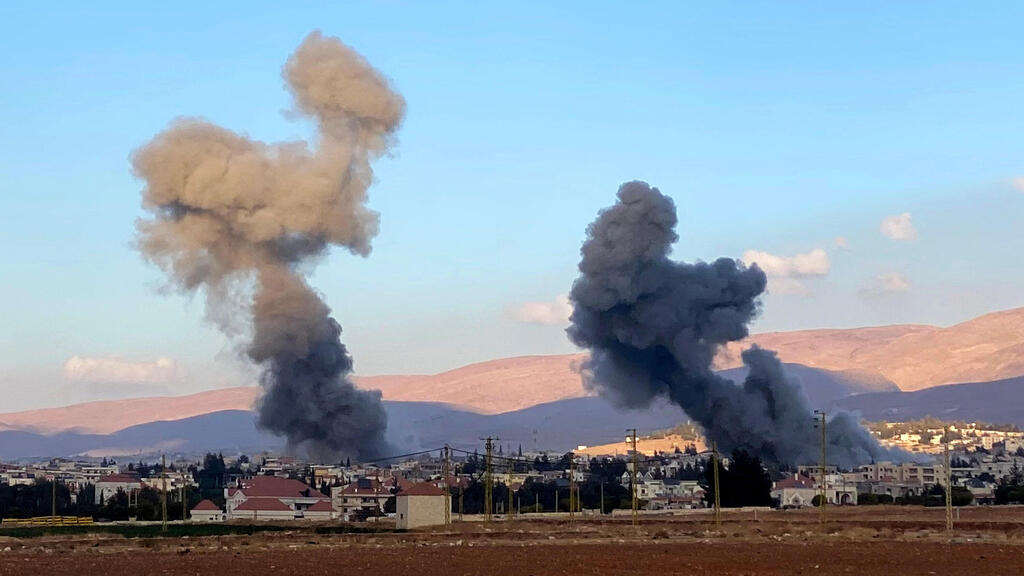Officials familiar with the talks between U.S. President Joe Biden's Middle East envoys Amos Hochstein and Brett McGurk and Prime Minister Benjamin Netanyahu and other senior officials said on Thursday that the administration's envoys are expected to return to Israel to finalize a deal, after meeting Biden and U.S. National Security Advisor Jake Sullivan.
"More important than the agreement will be an American document that will authorize Israel to act," they said. Jerusalem understands that there will most certainly be violations of the deal until the Lebanese military takes over responsibility for South Lebanon.
Saudi outlet Al-Hadath reported the two will return directly to the U.S. from Israel, without visiting Lebanon. Israeli officials denied that this was an indication of a lack of progress. "We didn't deceive ourselves into thinking this would be resolved today or within a few days," they said.
2 View gallery


Prime Minister Benjamin Netanyahu meeting with U.S. officials
(Photo: Maayan Tuaf, GPO)
"We have made progress toward implementing Resolution 1701, which will serve as the basis for a political agreement between Israel and Hezbollah in Lebanon. It’s important to make sure we have clarity, both from Lebanon and from Israel, about what would be required under 1701 to get its effective implementation,” U.S. Secretary of State Antony Blinken said.
A senior American official said that Thursday’s meetings in Israel were "substantial and constructive, focusing on a range of issues in depth including Iran, Lebanon, Gaza and securing the hostages' release."
McGurk and Hochstein met with Prime Minister Benjamin Netanyahu, Strategic Affairs Minister Ron Dermer, Defense Minister Yoav Gallant, Shin Bet Chief Ronen Bar, Mossad Director David Barnea and other senior Israeli officials.
"The two focused on efforts to secure a cease-fire agreement in Lebanon, allowing people on both sides of the Blue Line to return home safely, as well as new initiatives to secure the release of hostages which Hamas must address without delay,” the official added.
Footage of Israeli strikes in Tyre
“Prime Minister Netanyahu made it clear that the main point is not this or that agreement on paper but Israel's ability and determination to enforce the agreement and thwart any threat to its security from Lebanon, in a manner that will return our residents securely to their homes,” the Prime Minister's Office (PMO) said in a statement.
Meanwhile, Al-Hadath cited Hezbollah sources saying the terror group refused to withdraw beyond the Litani River as part of the agreement.
The Wall Street Journal also revealed on Thursday a draft of the pending agreement, which includes a clause allowing Israel to strike in Lebanon during a 60-day interim period in response to " imminent threats."
According to the report, Israel would enforce the agreement and relevant UN resolutions, including UN Security Council Resolution 1701 which concluded the Second Lebanon War in 2006.
The proposal was expected to face strong opposition from both Hezbollah and the Lebanese government due to concerns over violations of Lebanese sovereignty. As per the draft, Israel would need to withdraw its forces from Lebanon after a week, after which the Lebanese army would deploy in the country's south to help dismantle military infrastructure linked to Hezbollah and other militias.
According to the journal, neither Hezbollah nor the Lebanese government has accepted the proposal, which they argue "gives Israel too much leeway to continue attacking over the border," according to Lebanese and Arab officials familiar with the talks.
Lebanese officials said they were reluctant to reject the deal publicly as the document leaves room for continued negotiations that could ultimately bring the conflict to an end, according to Arab sources.
Get the Ynetnews app on your smartphone:





